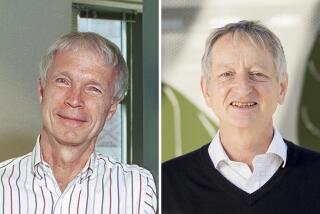2 U.S. Economists Win Nobel
- Share via
Two American economists whose pioneering research helps predict how people make choices--from how many hours they will work each day to whether they will ride the subway to their jobs--will share the Nobel Memorial Prize in Economic Sciences, the Royal Swedish Academy of Sciences announced Wednesday.
Tools developed by the researchers have helped policymakers plan transit systems, design job training programs and measure the economic cost of disasters such as the 1989 Exxon Valdez oil spill.
In awarding the prize to UC Berkeley’s Daniel L. McFadden and James J. Heckman of the University of Chicago, the academy cited their work in the field of microeconometrics, developing “theory and methods widely used in the statistical analysis of individual and household behavior.”
McFadden, 63, and Heckman, 56, will split the $915,000 prize, awarded in Stockholm early Wednesday.
“Theirs is a very natural pairing. Heckman’s work builds directly on what McFadden has done,” said Dale Jorgenson, a Harvard University economist.
McFadden learned of the prize in a 2:30 a.m. wake up call from Nobel officials, warning that they were going to make an announcement and that he should be prepared for a flood of telephone calls. The professor and his wife, Beverlee Tito Simboli, barely had time to get dressed before both phone lines were ringing.
“I didn’t even know I was under consideration,” McFadden told The Times.
Much of McFadden’s original research was done roughly three decades ago with the help of a National Science Foundation grant to analyze the potential for the Bay Area Rapid Transit system in San Francisco.
McFadden developed statistical analysis that could be applied to the “either-or” questions people face in their everyday lives.
“We used the data that was in place before BART was built to try and predict what [prospective passengers] would do after it was built,” McFadden said.
His analysis accurately predicted that people would use the system less than its planners thought and that BART would have trouble attracting riders who had to use other forms of transportation to get to a station.
More recently, McFadden and a Berkeley colleague, Kenneth Train, looked at what it would take to get commuters into alternative fuel vehicles. They discovered that concerns about the ease of refueling, the limited range of the vehicles and their high price tag will limit their commercial viability in California, a conclusion supported by the recent poor reception for electric cars in the state.
Berkeley Chancellor Robert M. Berdahl called McFadden’s work “groundbreaking” and said his methods helped in everything from planning the location of highways to making investments in phone service and housing for the elderly.
McFadden is now studying the link between health and wealth.
He and his wife plan to put some of the prize money into their Napa vineyard and farm, where they have “five cows, three ducks and 11 chickens.”
Berkeley has now won 17 Nobel prizes, including three in economics.
Heckman learned of the prize while attending an economics conference in Rio de Janeiro.
“I’m obviously very surprised. I’m very honored and I feel a sense of deep gratitude,” Heckman said in a teleconference.
Heckman is the 72nd University of Chicago Nobel recipient and the university’s 21st Nobelist in economics.
His research has focused on the flip side of people’s decisions, an area nearly impossible to analyze because of the inability to see what would have happened to people if they had chosen differently.
For example, while educators and policymakers have pushed the value of a high school equivalency certificate, Heckman’s research found that it turns out to have little economic value, said Steven Levitt, a University of Chicago economist.
Heckman found that people who obtain a high school equivalency degree tend to be hard workers who would have done well whether or not they had obtained the certificate, Levitt said. Heckman’s advance was to analyze what would have happened to this group of people had they made a different choice.
“Real-life data often isn’t in the right form for answering important questions. Jim’s contribution has been in recognizing that, being dissatisfied with that,” said Robert Michael, another University of Chicago professor.
The selection of McFadden and Heckman by the academy surprised many economists. The Nobel committee has not typically rewarded the type of technical work that characterizes their research.
“I don’t think people had forecast this choice in the various office pools at the economics departments, but I think people at the frontier of research will be very pleased,” said Paul Samuelson, a Nobel laureate and economist at the Massachusetts Institute of Technology in Cambridge, Mass. “Both are good, careful researchers.”
Samuelson speculated that the application of both winners’ research to social issues was a factor in their selection.
McFadden, for example, devised a way to measure the dollar harm to individuals from the Exxon Valdez oil spill in Alaska, Samuelson said. Heckman has examined how different forms of payment affect an individual’s work effort, he added.
In its announcement, the academy described micro-econometrics as an academic field “on the boundary between economics and statistics” useful for studying economic information about large groups of individuals, households and businesses.
Though the economics prize was first awarded in 1969, Nobel prizes date to 1901. They are the idea of Swedish industrialist and dynamite inventor Alfred Nobel, who died in 1896.
More to Read
Sign up for Essential California
The most important California stories and recommendations in your inbox every morning.
You may occasionally receive promotional content from the Los Angeles Times.











